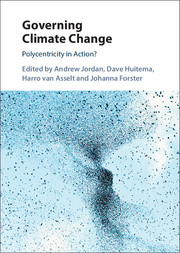Governing climate change: Polycentricity in action?

A newly published book, Governing Climate Change: Polycentricity in Action?, assesses how a more dispersed pattern of governing is influencing climate change policies.
The book, which was released in May 2018, includes one chapter written by FNI researcher Jørgen Wettestad and Katja Bidenkopf at the Institute for European Studies.
Web of carbon markets
Their chapter, ‘Harnessing the market – trading in carbon allowances’, describes and evaluates the dynamically evolving web of carbon markets at various government levels around the globe.
‘This web can be conceived as being polycentric in nature. Individual but interdependent carbon markets have developed in many jurisdictions since the late 1990s. The Kyoto Protocol and the Paris Agreement provides an overarching international umbrella for a wide range of designs, but they are not the only factor that has contributed to the inception, design and diffusion of carbon markets,’ explains Wettestad.
‘Individual countries, subnational entities and the EU have taken initiatives in response to various domestic and international dynamics. No existing carbon market is an exact replica of another: each has been tailored to domestic preferences, contexts and politics,’ Wettestad continues.
Testing polycentric thinking
Indeed, climate change governance is in a state of enormous flux. As emphasized by Wettestad and the book more generally, new and more dynamic forms of governing are appearing around the international climate regime centred on the United Nations Framework Convention on Climate Change (UNFCCC). Some appear to be emerging spontaneously, producing a more dispersed – described by Nobel Prize laureate Elinor Ostrom as ‘polycentric’ – pattern of governing.
In Governing climate change: Polycentricity in action? contributions from 40 of the world's foremost experts are brought together to provide the first systematic test of the ability of polycentric thinking to explain and enhance societal attempts to govern climate change.
It provides
*The first systematic application of polycentric theory in the area of cli mate change, offering a much more realistic appreciation of the potential and limits of polycentric governing
mate change, offering a much more realistic appreciation of the potential and limits of polycentric governing
*A novel attempt to comprehend climate governance as a single, evolving system, rather than a series of isolated parts
*Many fresh insights by a diverse team of international experts on the most significant domains and processes of governing
The editors of the book are Andrew Jordan, Dave Huitema, Harro van Asselt and Johanna Forster.
INOGOV network
The book, which is an open access publication, is a result of the INOGOV network on innovations in climate policy governance, financed by the EU COST programme. The INOGOV network has brought together scholars and practitioners within and outside Europe who focus on particular aspects of policy and governance innovation; their ‘sources’, ‘diffusion’, and ‘effects’. FNI’s Wettestad has been a member of the network’s Management Committee.
Read more about the INOGOV network here.
